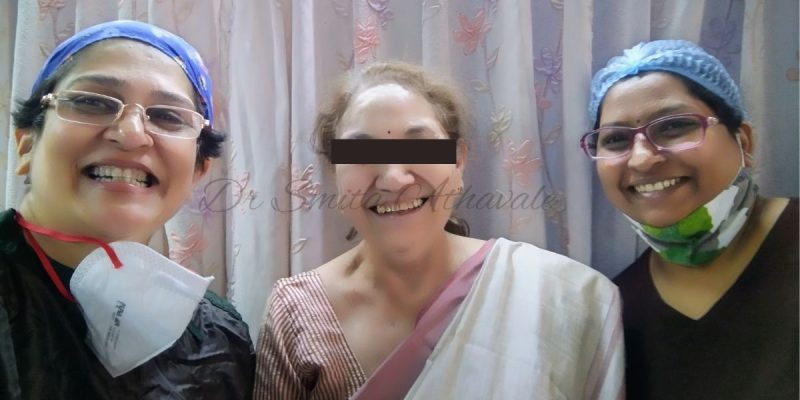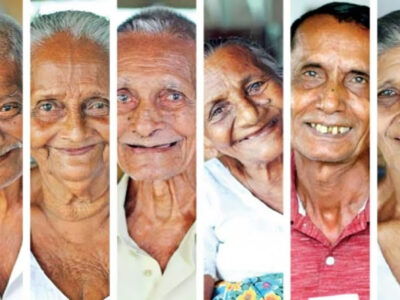A Second Childhood
It is often said that a geriatric patient is more difficult to manage on the dental chair than a pediatric patient! It is absolutely true and many of us have been through a tough time treating an elderly patient. Besides the plethora of systemic disorders and diseases, it’s understanding the psychology of elderly patients that is a challenge for dental clinicians.
Let’s understand our elderly patients going through their second childhood!!
Old age is considered as a second childhood, not only because of the increased dependency of the elderly person on the caregiver, but also the altered state of mind of the patient, which compels us to make such a comparison. Just like a child patient, an elderly patient can be extremely difficult to handle due to:
- his/her stubborn behavior
- difficulty in understanding and following the instructions
- irritability and
- low tolerance.
Inspite of the similarities, there is still a difference in handling the two age groups.
Understanding the Sunset Age-group
Though apparently similar, there is a stark difference in childhood and old age with regards to metabolism. Childhood is all about growth, creativity, energy and ‘anabolism’ (constructive metabolism). Whereas, old age means lack of energy, lethargy, inability to perform activities and ‘catabolism’ (destructive metabolism). Various diseases and systemic disorders add to the physical and mental agony of geriatric patients.
That’s why, it is extremely important to understand geriatric psychology in order to handle our ‘Elderly Child-like’ patient with care and compassion. As health care providers for our senior citizens, we need to have a thorough understanding of the physical, physiological and psychological challenges that an elderly person faces in day-to-day life. This also will reduce our stress at work and allow us to practice stress-free geriatric dentistry!

According to Dr. Richard Dupee, M.D. (2005), Ageism – The system of destructive false beliefs about the elderly is pervasive in our society. There are some specific ageist assumptions:
- They can’t hear
- They can’t remember
- They can’t think for themselves
- They are depressed & unproductive
In order to treat geriatric patients successfully, we need to get rid of these assumptions completely and keep an open mind towards these elderly patients, who have successfully contributed to our society, in the best of their capacity!
Geriatric Psychology
Geriatric Psychology or Geropsychology is defined as, “the field within psychology that applies the knowledge and methods of psychology to understanding and helping older persons and their families maintain well-being, overcome problems, and achieve maximum potential during later life.” – American Psychological Association
Geriatric Psychiatry
“Geriatric Psychiatry emphasizes the biological and psychological aspects of normal aging, the psychiatric effect of acute and chronic physical illness and the biological and psychosocial aspects of the pathology of primary psychiatric disturbances related to old age.” – American Psychiatric Association
The Three Ds of Geriatric Psychiatry
The elderly have a lot of physical ailments that are usually already under treatment. But like in all age- groups, mental health of the elderly too is most ignored. In the diagnostic criteria for geriatric psychiatry, the most commonly seen are these three Ds :
- Delirium
- Dementia
- Depression
A geriatric patient entering a dental clinic may have any or all of these symptoms. A dental clinician should be able to identify these and help the patients and their families find solutions for the same.
- Out of these, delirium is quite difficult to diagnose and is an independent risk factor responsible for mortality and morbidity of elderly patients.
- Dementia which may lead to Alzheimer’s disease can also be noted in older adults. Dementia can be present with delirium, depression, frailty and failure to thrive.
- Depression is also fairly common in geriatric patients, which may increase with aging and may pose difficulties in clinical management.
These three Ds may occur simultaneously and can increase the severity of each other. Identification of the symptoms and referral to or discussion with physician, psychologist and/or psychiatrist is crucial prior to clinical treatment of such patients. -Journal of Family Medicine & Primary Care
10 Do’s & Dont’s in Handling Geriatric Patients
As dental clinicians, it is not expected that we should be able to treat these physical and mental health conditions. What we should do is:
1) Take a thorough medical and dental history of the patient. Do contact patient’s physician for accurate details for medical history, known allergies and ongoing treatment if necessary. Ask the patient to get the recent (done within last 2 months) medical/ dental reports (blood tests, X rays or any other investigations) and ongoing medicine prescriptions (to understand the existing disease or disorder and to avoid poly-pharmacy and drug interaction).
2) Take an informed consent in the language well-comprehended by the patient and relative. The consent has to be duly signed (or thumb impression of patient in case the patient is debilitated or illiterate) by the patient and also signed by the primary care giver prior to commencing any treatment.
3) Talk to the patient and the primary care giver about the chief oro-dental problem as well as other problems/ailments that the patient is suffering from. Insist on having a responsible accompanying person (close relative or family friend) for every appointment for any necessary information and easy conversation or in case of any dental/medical emergency.

4) Depression, delirium and dementia can also be noted during conversation with the patient and inputs given by the accompanying person. Identify the ‘altered behavior, if any and note the clinical changes in physical, physiological and psychological status in geriatric patients during consultation, history taking, general and oral examination.
5) Loneliness and lack of attention to the geriatric patient by family members, could lead to the patient exaggerating the symptoms or making repetitive complaints of a non-existing cause. Sometimes, they just want somebody to talk to them and listen to them. In such cases, try to identify the underlying psychological/emotional issue and speak to them about it gently yet firmly. If necessary, suggest/insist on psychological counseling /psychiatric opinion.

6) Be sympathetic and listen to the patient’s complaint PATIENTLY. Make sure that the patient has grasped your question. Repeat the question if necessary and make sure you are clearly audible. In case of hearing deficiency – write down your clinical findings, advice and treatment plan in a clear and legible handwriting/large font size print-out and hand over to the patient and relative.
7) Ask the patient and the primary care giver to “write down” all the complaints at primary consultation or subsequent follow up visits. It makes identification of problem and troubleshooting later satisfactory. It also gives a sense of control to the patient as he can visually see his issues being solved and is assured that he has not ‘forgotten’ any complaint.

8) Always schedule the geriatric patients during morning sessions – after they finish their morning rituals, breakfast and medicines, if any. The geriatric patients are mentally and physically fresh during morning hours after a restful sleep. Avoid late evening appointments as most of the geriatric patients feel ‘low’ (lowering of physical and mental energy levels) in the evening (Sundowning Effect).
9) Avoid long appointments, as muscle fatigue sets in early in such patients. If long duration is unavoidable, plan a toilet break and coffee/snack interval during such lengthy appointments.

10) The dental operatory should be well-lit and well-ventilated. Please ensure soft and pleasant music playing in the background for mood elevation and a receptive mental state. Be gentle and smile often! Encourage your assisting staff to be polite and patient. A comfortable atmosphere always makes the treatment go easy!
This is a simple and practical guide for understanding geriatric psychology and to have a better clinical approach in treating our geriatric patients. Let’s not forget to be kind and respect the aged as even we all are going to be old one day…!

(Author Dr Smita Athavale has shared pictures from her practice with due consent from her patients)
Author – Dr Smita Athavale
















Comments